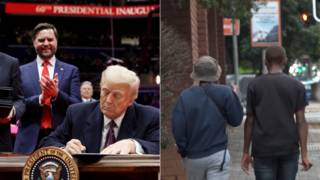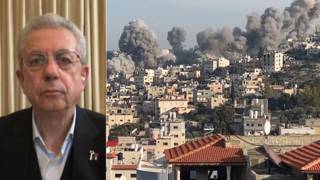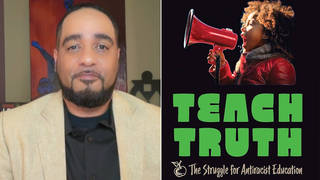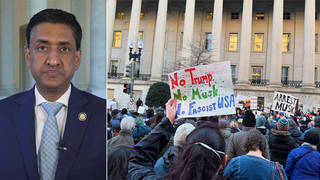
Related
Guests
- Brian Concannonhuman rights lawyer and executive director of the Institute for Justice and Democracy in Haiti.
Nearly 200 Haitians in Port-au-Prince were killed over the weekend on the orders of a powerful gang leader who reportedly targeted elderly practitioners of voodoo because he blamed them for sickening his son. The massacre is the latest chapter in Haiti’s ongoing political crisis, with gangs now controlling much of the capital despite a Kenyan-led security mission to stabilize the country and support the U.S.-backed Transitional Presidential Council. Earlier this week, Human Rights Watch called for what it described as a “full-fledged United Nations mission to Haiti.” Human rights lawyer Brian Concannon, director of the Institute for Justice and Democracy in Haiti, says what we are seeing is “the predictable result of dismantling democracy” by successive U.S. administrations, though foreign interference in Haiti goes back two centuries. He says that given the security situation today, it is “absolutely indefensible” for the Biden administration to continue deportations at this time, which the Trump administration is poised to intensify.
Transcript
AMY GOODMAN: This is Democracy Now!, democracynow.org, The War and Peace Report. I’m Amy Goodman.
We turn now to Haiti, the site of a horrific massacre this week. The leader of a powerful armed group in Haiti killed as many as 184 people in Cité Soleil, a neighborhood of Port-au-Prince. Most, if not all, the victims were elderly residents. According to one Haitian human rights group, the head of the Wharf Jérémie gang ordered the killings because he believed practitioners of voodoo had sickened his child.
According to the United Nations, more than 5,000 people have been killed in Haiti this year, as the country continues to face a spiraling political, humanitarian and security crisis. This is Wanja Kaaria of the World Food Programme.
WANJA KAARIA: So, the situation is getting much more critical. We’ve seen a growing nunmber of internally displaced, now getting to over 700,000 in the country. So the needs are huge.
AMY GOODMAN: Earlier this week, Human Rights Watch called for what it described as a “full-fledged United Nations mission to Haiti.” The group said, quote, “The mission should ensure a human rights-based response to restore security, the rule of law, and democratic governance,” unquote.
We’re joined now by Brian Concannon, human rights lawyer who serves as the executive director of the Institute for Justice and Democracy in Haiti. He’s joining us from Boston.
First of all, what do you understand happened this weekend, Brian, almost 200 people slain in Cité Soleil? You have worked on the issue of Haiti for decades. Talk about what’s happening today.
BRIAN CONCANNON: Well, thanks, Amy, for having me back, and thanks, as always, to Democracy Now! for covering Haiti.
What’s happening today is the continued devolution of Haiti that has — I mean, it’s got causes going back 200 years, but the more proximate causes are that, since 2012, the United States has propped up a political movement around the PHTK party, that has dismantled Haiti’s democracy and stolen its resources. And you have a situation like you had this weekend, where gang leaders — because the state is absent from many areas of Cité Soleil, a gang leader was able to execute possibly a hundred or more people because he was upset about his child being killed.
And this is really the predictable result of dismantling democracy. And there were massacres before. You’ve covered the massacre, like the 2018 massacre in La Saline. And right after that, Maxine Waters went down, and she said, “Unless this impunity is stopped, you’re going to have more massacres.” And we are having more massacres, and we will continue to have massacres until Haiti is allowed to establish a democratic government.
AMY GOODMAN: Can you talk about this all happening after Haiti’s new Transitional Presidential Council has been in place for about a month? What have they accomplished? And what’s happening with the Kenyan force that’s in?
BRIAN CONCANNON: Well, the presidential council — it’s a little bit complicated. The presidential council, which is kind of acting as the president of Haiti, they’ve been in office since April. What happened in November was a new government — so, that’s a prime minister and ministers — was sworn in. The day that the prime minister was sworn in, gangs attacked areas that are strongholds of Haiti’s popular resistance. They shot at airplanes. So, it appears as if the gangs are not happy with the installation of the new government.
In terms of the MSS force, which is a — it’s a force authorized by the U.N. Security Council but is explicitly not a U.N. force, so it’s basically under the leadership of Kenya. That force has 432 members. It has been deployed since June. And it’s important to note that 432 is far fewer than just the attrition of the Haitian police since the mission was deployed. It has not really been successful at having any sustained security improvements. There have been a few operations where the MSS mission, along with Haitian police, have been able to dislodge gangs from strategic areas. But typically, when the MSS and Haitian police need to go elsewhere, then the gangs just come right back in, or the gangs just move on to another, more vulnerable area.
AMY GOODMAN: I wanted to read a headline from the Miami Herald last week: “Gang violence shutdown Haiti’s main airport. That hasn’t stopped U.S. deportation flights.” Deportation planes are now landing in Cap-Haïtien. That’s Haiti’s second-largest city. So, you have flights being shot at, yet still you have the U.S. deporting Haitians to Haiti right now.
BRIAN CONCANNON: Yes, and they’re being placed in Cap-Haïtien. And many of them are from other places, including Port-au-Prince, but there’s no way to get safely to Port-au-Prince unless you have the money to rent a helicopter. And so, it is absolutely indefensible to be sending people back to these conditions.
AMY GOODMAN: So, what do you demand of the U.S. government?
BRIAN CONCANNON: What the U.S. government needs to do is to stop propping up the PHTK party and other undemocratic parties in Haiti. I talked to my — just after the U.S. election, I talked with my colleague Mario Joseph, who’s Haiti’s most prominent human rights lawyer. He was worried about what was going to happen in the U.S. with the new administration, because of what you so well covered earlier in today’s news. But he said, “It really doesn’t make a difference for Haitians, because we don’t see a difference between Democratic and Republican administrations.” And what he’s talking about is really two centuries of U.S. policies that have prevented Haiti from having a strong, prosperous and an independent government.
And what needs to happen is the U.S. needs to stop doing that. The U.S., actually, in fact, from about 1994 to 2000, we did allow democracy to work in Haiti, and democracy, in fact, worked. You had improvements in security, improvements in education, healthcare, the economy, across the board. But since 2004, when — again, Democracy Now! covered this very well — the U.S. toppled Haiti’s regime, we’ve continued to back undemocratic elements, and it has led to the very predictable disaster that we have now. What needs to change is the U.S. policy that does not want to allow Haiti to be free.
AMY GOODMAN: Now, you just briefed the U.S. Congressional Caribbean Caucus on Haiti. What are you calling on the Trump administration to do? Not only is President Trump talking about starting mass deportations on day one, but through the campaign, he and, well, now the Vice President-elect JD Vance have been talking about Springfield, Ohio, as ground zero, as the first place they’ll start, because of the large Haitian population.
BRIAN CONCANNON: Yes, the whole point of the rhetoric around Springfield, Ohio, was to demonize majority-Black immigrants as a way of exciting a base that gets excited by white supremacist rhetoric. The administration is going to continue to do that, because it works.
What needs to happen is the rest of us need to step up. And we need to step up by going into the streets, by protesting. We need to step up. And IJDH will do this, as we did the last Trump administration. We’ll go to court. People need to work within the political system, call their members of Congress. We need to resist on all fronts. And, you know, as discussed earlier in the segment, it’s hard to predict exactly what’s going to happen, but we can predict that there’s going to be hate-inspired, race-based persecution, and the rest of us need to be ready to step up to stop that.
AMY GOODMAN: Well, I want to thank you very much for being with us, Brian Concannon, human rights lawyer, executive director of the Institute for Justice and Democracy in Haiti. He’s speaking to us from Boston.
Coming up, we look at the tragic deaths of two Black men who were killed while experiencing mental health crises: the New York street performer, Michael Jackson impersonator Jordan Neely, and the award-winning piano virtuoso Herman Whitfield III. Herman Whitfield was killed by Indianapolis police. Neely was killed by another passenger on the subway. Both were tried, and both — all of them were acquitted. Stay with us.
[break]
AMY GOODMAN: The award-winning piano virtuoso Herman Whitfield III playing one of his own compositions on the piano. He was killed by police while experiencing a mental health crisis. We’ll talk more about his case later in the segment.












Media Options